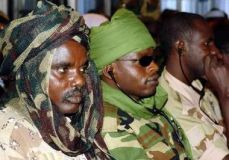Darfur talks tackle regional govt, national representation
Dec 3, 2005 (ABUJA) — Darfur rebels began to negotiate hard issues with the Sudanese government for the first time at peace talks in the Nigerian capital, but initial posturing suggests a tough slog ahead, participants said on Saturday.
 The first discussions on proposals for a regional government for the west, a vice-president from Darfur, and changes to borders sparked heated exchanges between the two sides.
The first discussions on proposals for a regional government for the west, a vice-president from Darfur, and changes to borders sparked heated exchanges between the two sides.
But there was relief that at last the two sides were tackling crucial issues that were barely touched upon in six previous rounds of talks.
“This is the first time that they are looking at the substantive issues,” said Sam Ibok, one of the chief mediators from the African Union. “Now they are going into the nitty-gritty of the negotiations — the issue of who gets what.”
“There is a long, difficult road ahead. The positions are still very far apart,” he added.
Non-Arab rebels took up arms in early 2003 saying the central government marginalized Darfur and gave Arab tribes preferential treatment.
The government used proxy militias to quash the revolt, during which tens of thousands have been killed and more than 2 million forced from their homes. The United States has said the violence constituted genocide.
The six previous rounds of talks in Abuja made little headway, plagued by rebel divisions and escalating violence on the ground. But this seventh round opened with more optimism.
The two main Darfur rebel groups, adopting a newly unified position, drafted a proposal for a regional government with wide-ranging powers, a vice president from Darfur and special recognition to the west as a marginalized region.
But the government adopted a hard stance, saying those issues were not up for discussion and that the movements did not represent all the people of Darfur.
“We say we represent the people of Darfur more than they do,” said government spokesman Amin Hassan Omar.
He rejected claims that Darfur is similar to the south, which was at war with Khartoum for all but 11 years since Sudan gained independence from Britain in 1956.
Rebels say Darfur is as marginalized as the south and should get similar special provisions for positive discrimination in development and central government positions.
“The south is culturally different, ethnically different…(but) Darfur is not different,” Omar said.
He also said some parts of Darfur were more developed than other regions of Sudan and suggested a joint commission to establish the development needs of remote areas.
Rebels accused the government of time wasting and not seriously negotiating. “The government is not serious — they have to engage on these issues,” said Abdel Latif, a member of the main rebel Sudan Liberation Army (SLA) negotiating team.
(Reuters)
